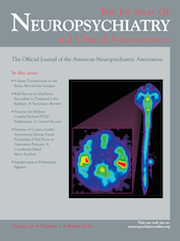Case Report
“B.” is a 58-year-old, divorced White woman with a long history of bipolar disorder and multiple psychiatric hospitalizations. In addition to her psychiatric problems, B. has numerous stable medical conditions, including diabetes mellitus type II, hypertension, chronic kidney disease, hyperlipidemia, hypothyroidism, and arthritis. She was admitted to our state psychiatric hospital after being detained because of manic symptoms with psychosis. Recrudescence of symptoms appeared related to discontinuation of carbamazepine because of lowered platelet count. Collateral information indicated sustained stability over the past 10 years on a combination of carbamazepine, quetiapine, and clonazepam.
After admission, an adequate trial of quetiapine failed to control her severe symptoms. A trial of olanzapine initially resolved manic and psychotic symptoms; unfortunately, the improvement was not sustained, and, approximately 9 weeks later, B. developed catatonia. Olanzapine was cross-tapered to aripiprazole. Marked improvement was noted during the 3-week cross-taper, with only some residual somatic delusions and mild catatonia. Clonazepam was added for catatonia based on previous good response to this medication. Despite treatment with aripiprazole and clonazepam, B. experienced exacerbation of catatonia. Aripiprazole was continued, and clonazepam was discontinued and rapidly cross-tapered to lorazepam 6 mg IM/day, followed by complete stabilization. Three weeks later, a reduction in the dose of lorazepam led to depressed mood followed by catatonia, with pronounced muscle rigidity, immobility, and mutism. NMS was ruled out by normal vital signs and normal CBC, CMP, and CPK. Increasing lorazepam to 12 mg IM/day, discontinuation of aripiprazole, and reinstitution of carbamazepine resulted in muscle relaxation, with no further improvement after 3 weeks of treatment. Amantadine was added, with muscle relaxation noted a few hours after the first dose. After 72 hours of treatment, she was independent with feeding and general care, and was walking, talking, and smiling. There was no evidence of psychotic, depressive, or manic symptoms. Because of complications related to discharge, we had the opportunity to observe her for 4 additional months, during which she maintained excellent stability. Her platelet count remained within normal limits throughout her hospital stay.
Discussion
This case illustrates a rapid and significant response of severe catatonic symptoms to the addition of amantadine to lorazepam and carbamazepine in a patient with a long history of bipolar disorder.
1 The initial response to atypical antipsychotics (olanzapine and aripiprazole) was marked by improvement of manic and psychotic symptoms, followed by catatonia. Was catatonia induced by the antipsychotics or the course of the illness, alternating with cycles of depression and mania?
2 The third episode of catatonia appeared to be the most severe in terms of duration and incapacitating symptoms and did not respond to high-dose lorazepam. Is each episode of catatonia, followed by a more severe episode, less responsive to previously successful treatments? In the third episode, was catatonia a form of mania following depression or a progression of depression with psychosis? What role did amantadine, in combination with carbamazepine and lorazepam, play in the elimination of psychosis?

